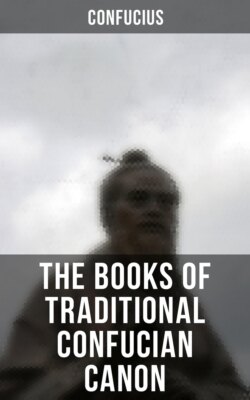Читать книгу The Books of Traditional Confucian Canon - Confucius - Страница 74
На сайте Литреса книга снята с продажи.
ОглавлениеHexagram LVIII.58 Tui
Table of Contents
Tui intimates that (under its conditions) there will be progress and attainment. (But) it will be advantageous to be firm and correct.
1. The first line, undivided, shows the pleasure of (inward) harmony. There will be good fortune.
2. The second line, undivided, shows the pleasure arising from (inward) sincerity. There will be good fortune. Occasion for repentance will disappear.
3. The third line, divided, shows its subject bringing round himself whatever can give pleasure. There will be evil.
4. The fourth line, undivided, shows its subject deliberating about what to seek his pleasure in, and not at rest. He borders on what would be injurious, but there will be cause for joy.
5. The fifth line, undivided, shows its subject trusting in one who would injure him. The situation is perilous.
6. The topmost line, divided, shows the pleasure of its subject in leading and attracting others.
Footnotes
58. The trigram Tui symbolises water as collected in a marsh or lake; and its attribute or virtus is pleasure or complacent satisfaction. It is a matter of some difficulty to determine in one's mind how this attribute came to be connected with the trigram. The Khang-hsî editors say:--'When the airs of spring begin to blow, from the collections of water on the earth the moistening vapours rise up (and descend again); so, when the breath of health is vigorous in a man's person, the hue of it is p. 194 displayed in his complexion. Akin to this is the significance of the hexagram Tui representing a marsh, as denoting pleasure. Although the yin lines give it its special character they owe their power and effect to the yang; so when the qualities of mildness and harmony prevail in a man, without true-heartedness and integrity to control and direct them, they will fail to be correct, and may degenerate into what is evil. Hence it is said that it will be advantageous to be firm and correct!'
The feeling then of pleasure is the subject of this hexagram. The above quotation sufficiently explains the concluding characters of the Thwan; but where is the intimation in Tui of progress and attainments? It is supposed to be in the one weak line surmounting each trigram and supported by the two strong lines. Fancy sees in that mildness and benignity energised by a double portion of strength.
Line 1, strong in the place of strength, with no proper correlate above, is thus confined to itself. But its subject is sufficient for himself. There will be good fortune.
Line 2, by the rule of place, should be weak, but it is strong. Without any proper correlate, and contiguous to the weak 3, the subject of it might be injuriously affected, and there would be cause for repentance. But the sincerity natural in his central position counteracts all this.
The view of the third paragraph that appears in the translation is derived from the Khang-hsî editors. The evil threatened in it would be a consequence of the excessive devotion of its subject to pleasure.
'The bordering on what is injurious' in paragraph 4 has reference to the contiguity of line 4 to the weak 3. That might have p. 195 an injurious effect; but the subject of 4 reflects and deliberates before he will yield to the seduction of pleasure, and there is cause for joy.
The danger to the subject of line 5 is from the weak 6 above, in whom he is represented as 'trusting.' Possibly his own strength and sincerity of mind may be perverted into instruments of evil; but possibly, they may operate beneficially.
The symbolism of paragraph 6 is akin to that of 3, though no positive auspice is expressed. The subject of line 3 attracts others round itself for the sake of pleasure; the subject of this leads them to follow himself in quest of it.
